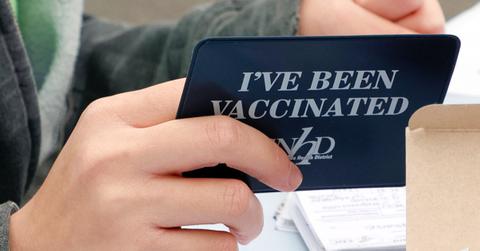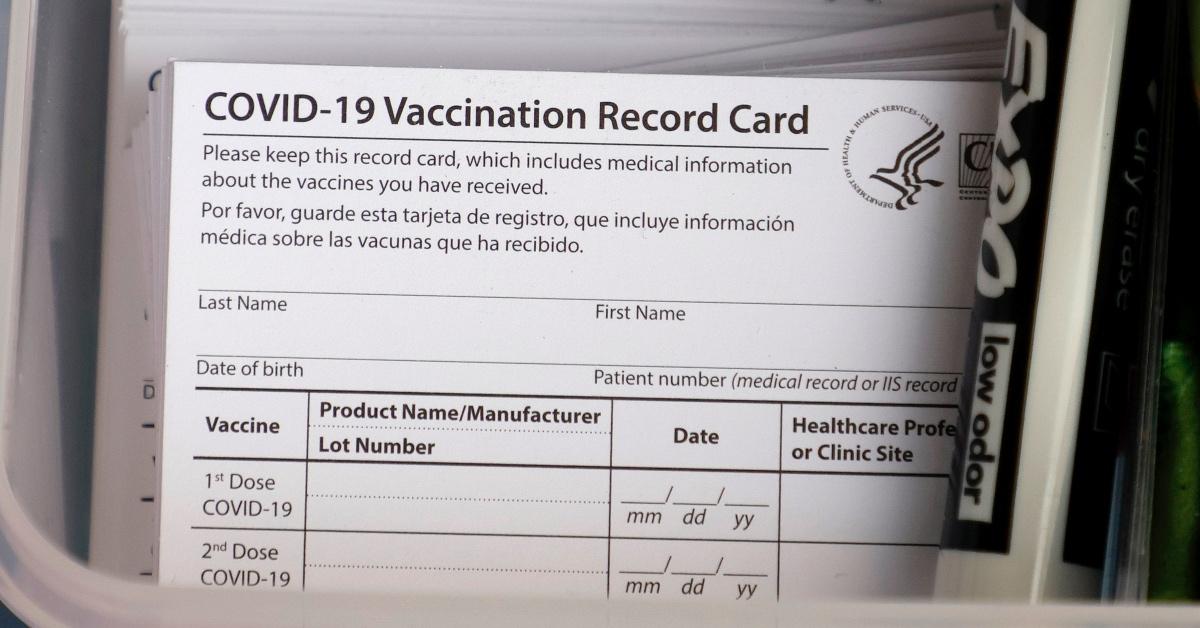How Does the CDC Define Being Fully Vaccinated Against COVID-19?
If you've received all of the required doses of your COVID-19 vaccine, you're considered fully vaccinated. At some point, the CDC might add the booster shot to the definition.
Dec. 27 2021, Published 1:37 p.m. ET

As COVID-19 cases surge and new variants of the virus develop, health experts are pushing for all Americans to become fully vaccinated against the novel coronavirus. While multiple companies have developed their own version of the COVID-19 vaccine, all of them are effective in combating the severe symptoms that the virus carries.
With the different types of vaccines on the market and the FDA giving Americans the green light to mix and match COVID-19 vaccines, it can be confusing to know if a person is fully vaccinated. So, how does the CDC define being fully vaccinated?
If you meet certain guidelines, the CDC considers you fully vaccinated against the COVID-19 virus.

According to the CDC, a person is considered fully vaccinated against COVID-19 after:
- It has been two weeks since they received their second dose in a two-dose series. The Pfizer-BioNTech and Moderna vaccines are administered in two doses, which means that you must receive both doses to be considered fully vaccinated.
- It has been two weeks since you received a single-dose vaccine. Johnson & Johnson’s Janssen vaccine is administered in one dose.
Although booster shots are available and recommended, they aren't a requirement if you’re looking to become fully vaccinated against the COVID-19 virus. In October 2021, the FDA authorized Americans to mix or match booster shots, which gives you the flexibility of being able to choose which vaccine you want regardless of the type you initially received.
If you received a Pfizer-BioNTech or Moderna vaccine, you’ll need to wait at least six months before you can get a booster shot. If you received the Johnson & Johnson’s Janssen vaccine, you’re able to get a booster shot two months after becoming vaccinated.
Although the above-mentioned guidelines are what the CDC is using to define being fully vaccinated, rumor has it the agency might change the definition. With the omicron variant of the COVID-19 virus causing a significant spike in cases, “early studies suggest that current COVID-19 vaccines will require three doses to offer sufficient protection against the variant,” reports The Wall Street Journal.
What are some things the CDC says you can do after becoming fully vaccinated against the COVID-19 virus?
COVID-19 vaccines have been authorized for use by anyone who's aged five and older. Although the CDC urges individuals to continue taking precautionary measures even after they become fully vaccinated, the agency says that you can do the following once you’ve received all of the required vaccine doses:
- You generally don’t need to wear a mask in outdoor settings. The CDC does recommend that you continue wearing a mask indoors since this will help lower your chances of becoming infected with variants of the COVID-19 virus and spreading it to others.
- You can travel in the U.S. without having to get tested before or after travel. However, you will still be required to provide “a negative test result or documentation of recovery from COVID-19” before you board an international flight to the U.S.
How many Americans are vaccinated against the COVID-19 virus?
As of Dec. 26, 61.7 percent of the U.S. population was fully vaccinated against the COVID-19 virus, reports the Mayo Clinic. This equates to about 203 million people. As of Dec. 27, 500 million doses of the COVID-19 vaccine have been administered in the U.S., reports Bloomberg. This averages to about “1.13 million doses per day over the last week.”
The Mayo Clinic provides a state-by-state breakdown of the fully vaccinated population.
The CDC endorses the ACIP's recommendation that gives preference to an mRNA COVID-19 vaccines.
There are three versions of the COVID-19 vaccine that have been authorized for use in the U.S—Pfizer-BioNTech, Moderna, and Johnson & Johnson’s Janssen. All three COVID-19 vaccine brands have proven through clinical trials to be effective at protecting against the COVID-19 virus, although infection is still possible.
While you're free to choose which COVID-19 vaccine you would like to receive, the CDC announced on Dec. 16 that it was endorsing the ACIP's (Advisory Committee on Immunization Practices) “clinical preference for individuals to receive an mRNA COVID-19 vaccine over Johnson & Johnson’s Janssen vaccine.”
Pfizer and Moderna’s vaccines are both mRNAs.
